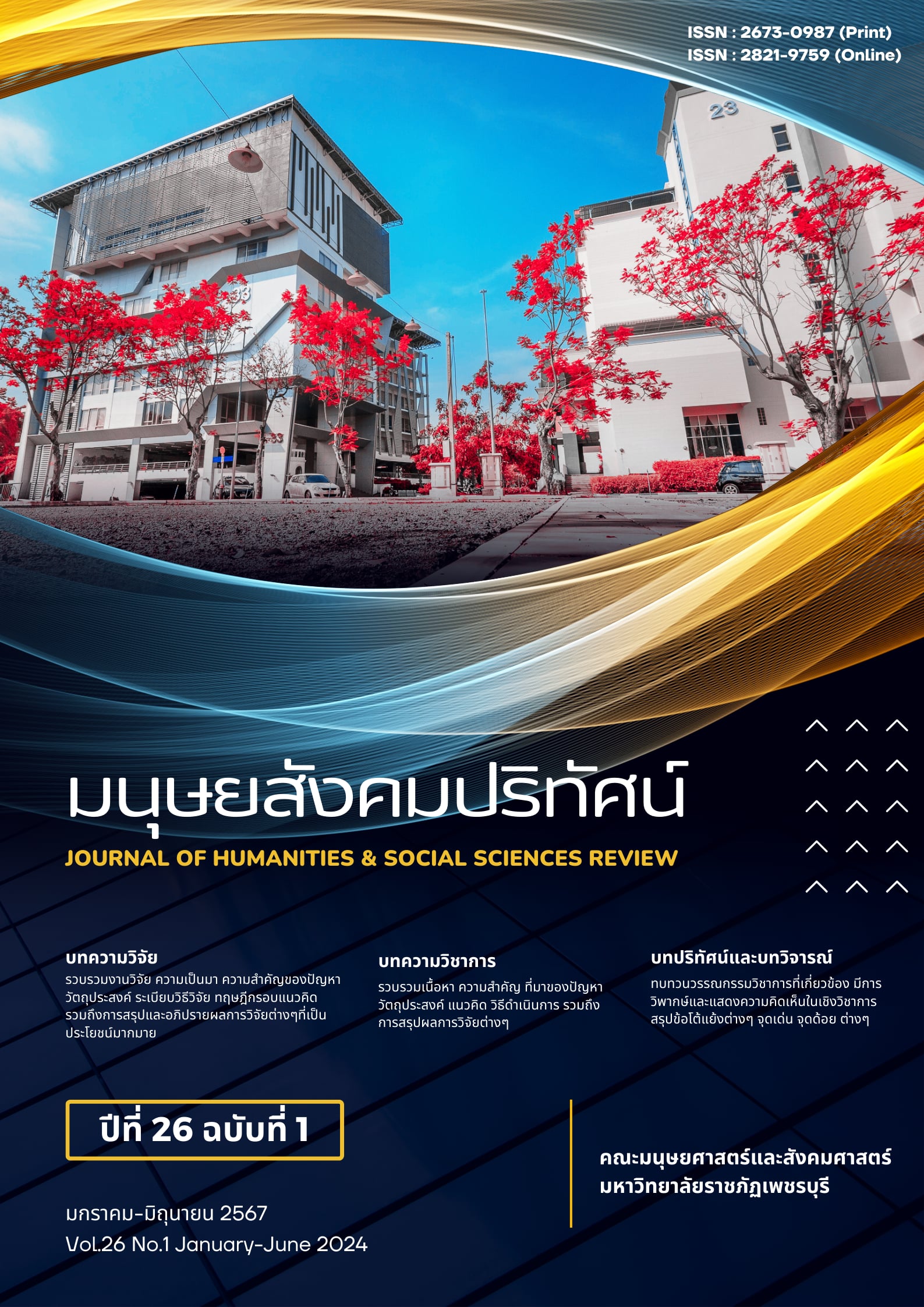Cultural worldview from Petchaburi local literature
Main Article Content
Abstract
This academic article aimed at studying the cultural worldview from Petchaburi local literature. The result showed the cultural worldview in 2 dimensions which were 1) religion and 2) folklife. The religious worldview reflected that Buddhism was a part of living in daily life. This meant before doing any business should remind the graces of Buddhism concepts (Buddha, Dharma, Monk), parents, and teachers. Buddhist concepts, especially morals and ethics, there were teaching to take care of teacher, be diligent, and associated with good friends. Cultural worldview on folk ways reflects that government officials are involved in Breweries and casinos operated by Chinese people. Thai people like to marry Chinese people. Chinese and Thai people work as traders. The women of Ban Samo Phlue work as weavers and people in Phetchaburi make a living by making sugar for the perspective of people from different areas, such as Krom Phra Rajawang Bowonwichaichan realized that Phetchaburi enjoy Phetchaburi people as enjoy watching dramas because they expressed Delights while they were watching Wang Na's dramas
Article Details
1. Any views and comments in the article are the authors’ views. The editorial board has not to agree with those views and it is not considered as the editorial board’s responsibility. In case, there is any lawsuit about copyright infringement, it is considered as the authors’ sole responsibility.
2. The article copyright belonging to Faculty of Humanities and Social Sciences, Phetchaburi Rajabhat University are copyrighted legally. Republication must be received direct permission from the authors and Phetchaburi Rajabhat University in written form.
References
ทวีโรจน์ กล่ำกล่อมจิตต์. (2556). พราหมณ์สมอพลือ. เพชรบุรี: เพชรภูมิการพิมพ์.
ธนู บุณยรัตพันธุ์, ปริวรรต. (2523). วรรณกรรมพริบพรี 4 เรื่อง. กรุงเทพฯ: อักษรสยาม.
นฤทธิ์ ศรีวรรณ, ปริวรรต. (2542). ศึกษาสมุดไทย ประถม ก กา ฉบับพื้นบ้านเพชรบุรี. คณะมนุษยศาสตร์และสังคมศาสตร์ สถาบันราชภัฏเพชรบุรี.
นิพัทธ์พร เพ็งแก้ว. (2550). เล่าเรื่องเมืองเพชร. กรุงเทพฯ: พิมพ์คำ.
บุญลือ วันทายนต์. (2539). สังคมและวัฒนธรรมท้องถิ่นไทย. กรุงเทพฯ: มหาวิทยาลัยรามคำแหง.
บัวผัน สุพรรณยศ. (2550). ภาษาและวัฒนธรรม. กรุงเทพฯ: กองบริการคำสอนและสิ่งพิมพ์ มหาวิทยาลัยหอการค้าไทย.
ประสิทธิ์ กาพย์กลอน และนิพนธ์ อินสิน. (2527). ภาษากับวัฒนธรรม (พิมพ์ครั้งที่ 5). กรุงเทพฯ: ไทยวัฒนาพานิช จำกัด.
ประสิทธิ์ ธีรานันท์, บรรณาธิการ. (2542). “นิราศเมืองเพชร” ฉบับพระราชนิพนธ์กรมพระราชวังบวรวิชัยชาญในสมัยรัชกาลที่ 5. ใน พระปิยมหาราชกับเมืองเพชร. เพชรบุรี: เพชรภูมิการพิมพ์.
มณีปิ่น พรหมสุทธิรักษ์. (2553). ลักษณะของวรรณคดีไทย. ใน พัฒนาการวรรณคดีไทย หน่วยที่ 1-7. (พิมพ์ครั้งที่ 6). นนทบุรี: มหาวิทยาลัยสุโขทัยธรรมาธิราช.
ล้อม เพ็งแก้ว, บรรณาธิการ. (2525). ประชุมนิราศเมืองเพชรบุรี. กรุงเทพฯ: กรุงสยามการพิมพ์.
สมาน โซะเหม. (2528). มหาชาติฉบับเมืองเพชรบุรี กัณฑ์ชูชก : การศึกษาเชิงวิเคราะห์. วิทยานิพนธ์ศิลปศาสตรมหาบัณฑิต มหาวิทยาลัยศิลปากร.
สุกัญญา ภัทราชัย. (2551). วรรณคดีกับสังคมชนบท. ใน พัฒนาการวรรณคดีไทย หน่วยที่ 8-15 (พิมพ์ครั้งที่ 8). นนทบุรี: มหาวิทยาลัยสุโขทัยธรรมาธิราช.
เสยย์ เกิดเจริญ, บรรณาธิการ. (2524). ประชุมวรรณกรรมคำสอนจากวัดในจังหวัดเพชรบุรี. ศูนย์วัฒนธรรมจังหวัดเพชรบุรี วิทยาลัยครูเพชรบุรี. (เอกสารอัดสำเนา).
แสนประเสริฐ ปานเนียม, ปริวรรต. (2556). กุมาโรวาท. เพชรบุรี: เพชรภูมิการพิมพ์.


